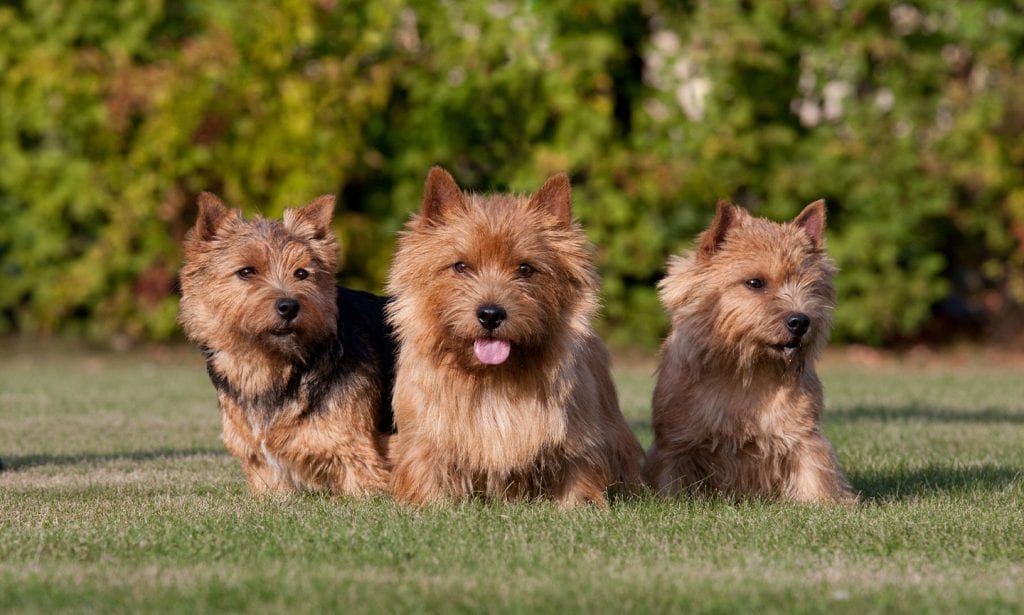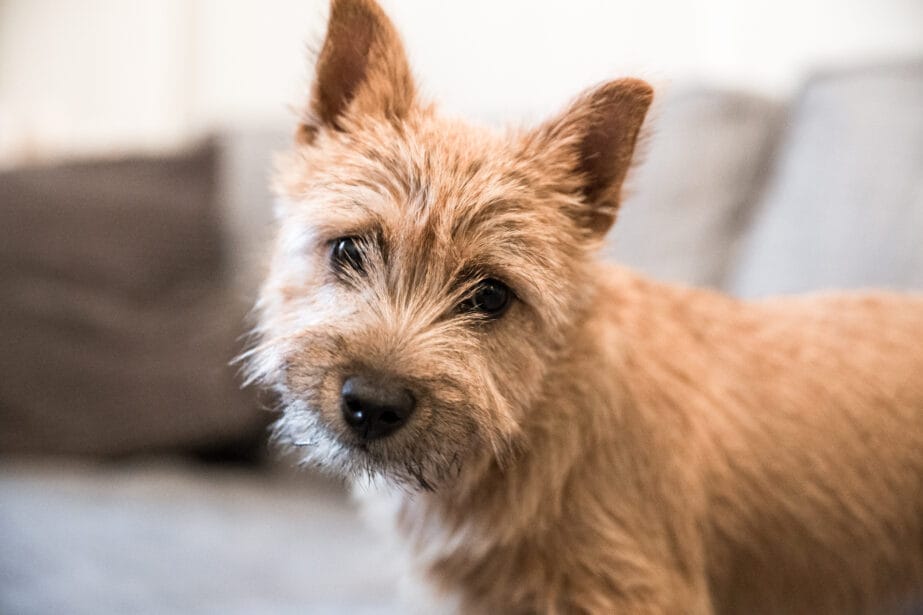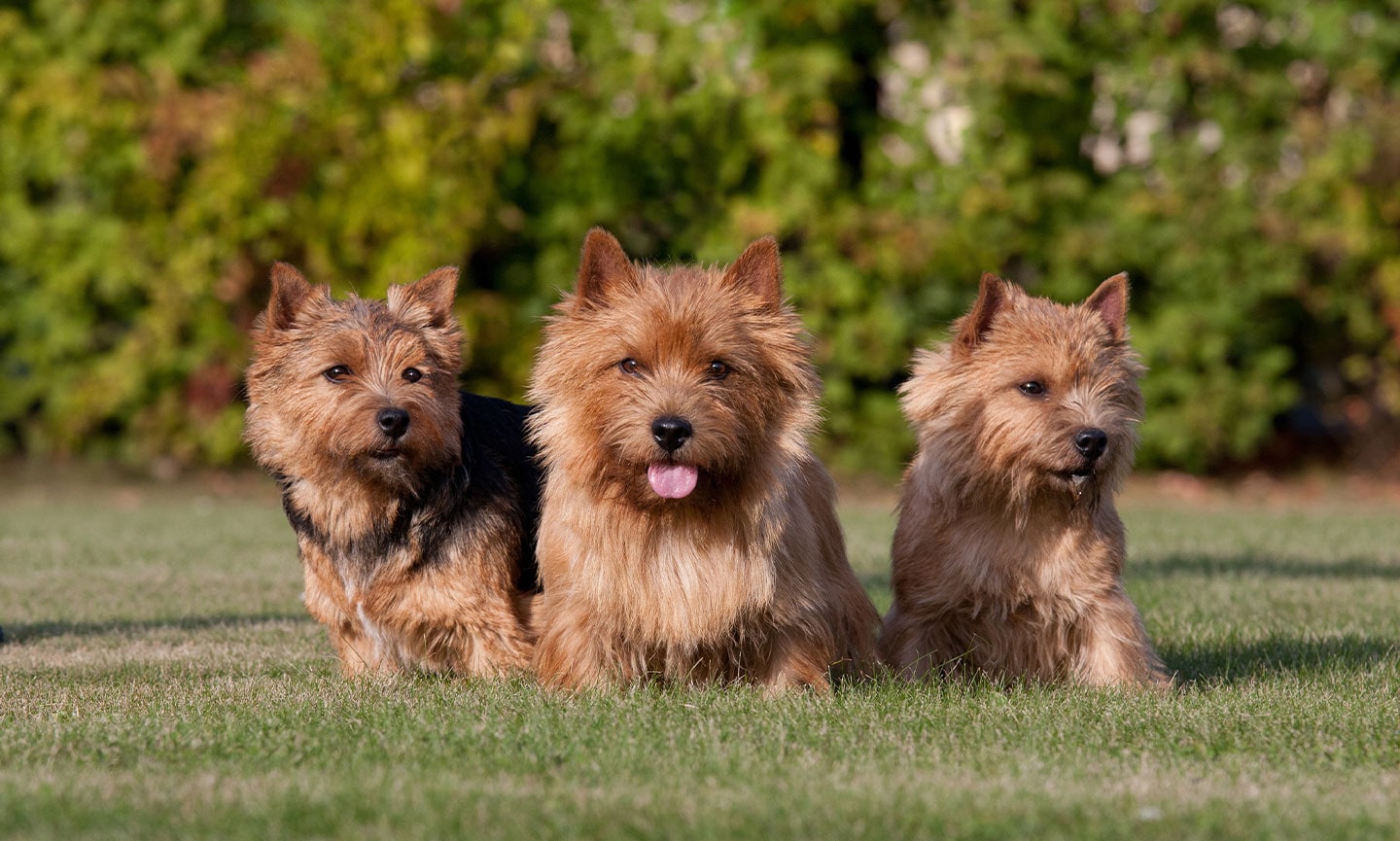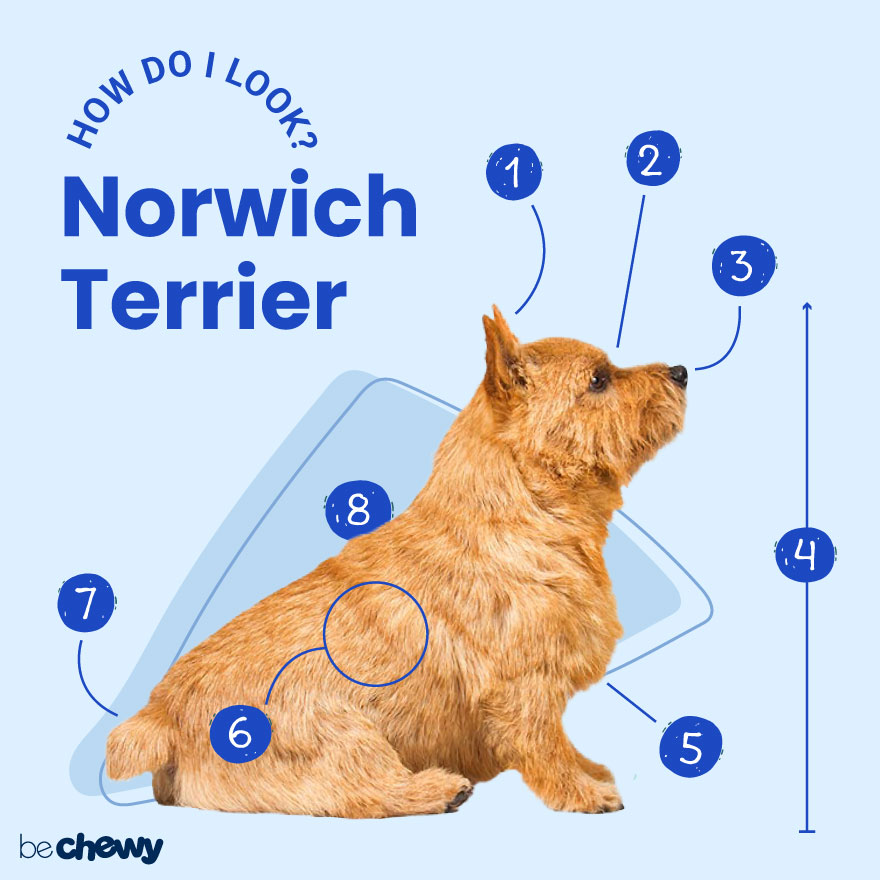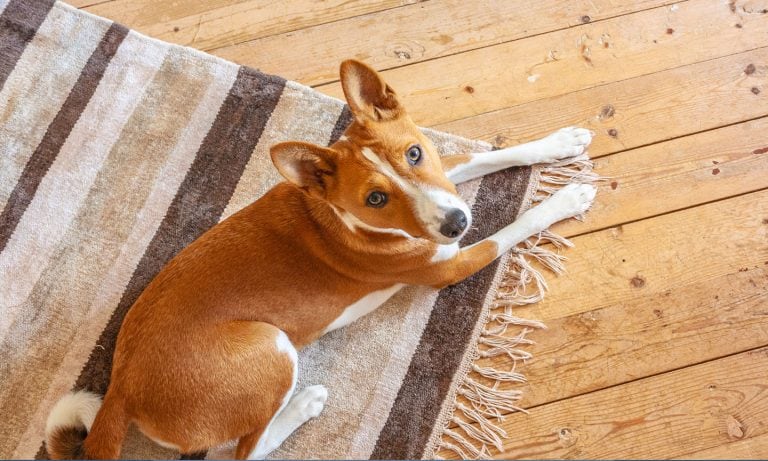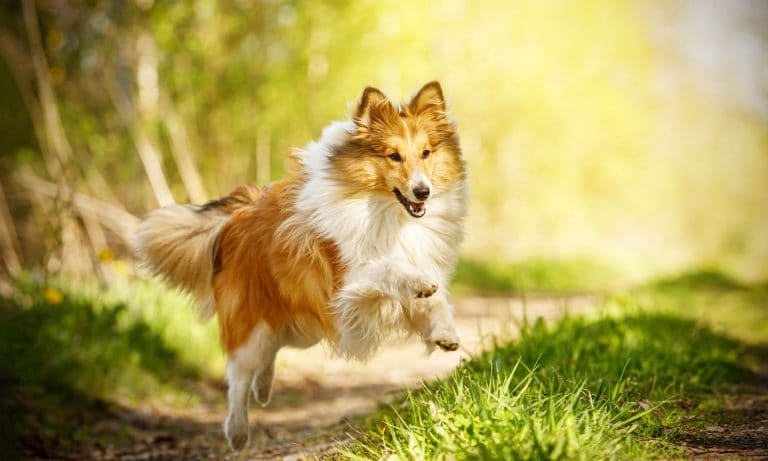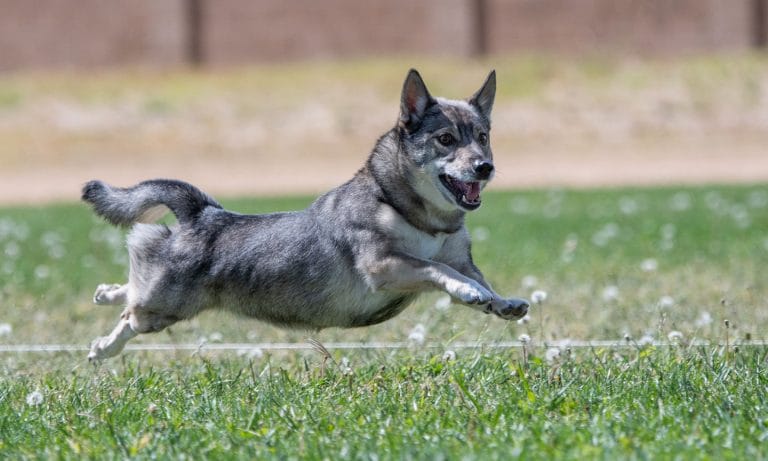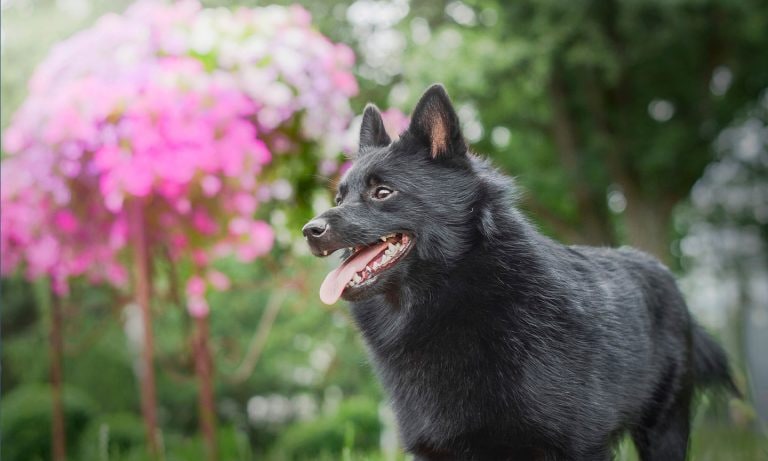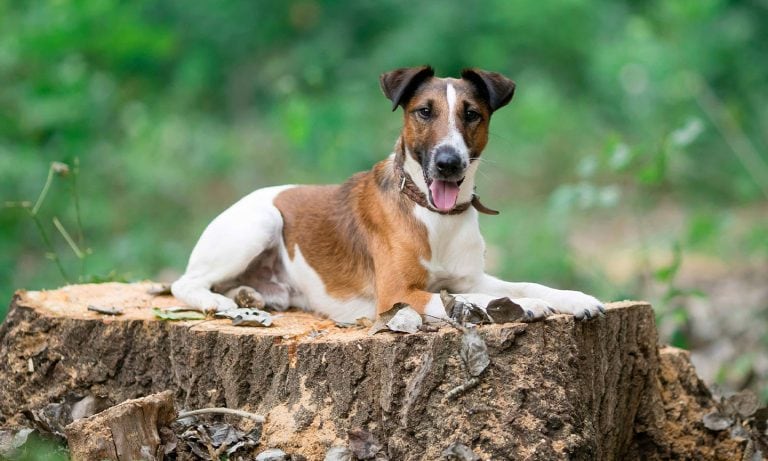Norwich Terriers are plucky, playful and portable companions who have the heart of a warrior—and they’ll give that heart to you fully. They’ll become your most reliable tag along for every adventure, whether its on your daily hike or for some fetch time in the backyard when you’ve had a long week. This pup will move and groove to your rhythm, which is convenient, because you’ve always been the cruise director type anyway. You’re a confident leader, which is just what this dog needs. In return, you’ll find yourself with a gallant hero, willing to fearlessly tangle with just about any foe… so long as they’re smaller than the Norwich’s own formidable 10 inches. But hey, size, shmize. You’ve always been more into brains than brawn anyway.
Breed Snapshot
Temperament:
PluckyHigh-EnergyFriendlyCoat Color:
RedWheatenBlack And TanGrizzle
Best For
Norwich Terriers are lively and affectionate dogs known for having a big personality despite their small stature. They thrive in active homes with experienced pet parents who can provide plenty of mental stimulation and appreciate their spirited nature.
Norwich Terrier Temperament
The Norwich Terrier temperament is approachable and affectionate. These characteristics make them great family dogs. Not only do these pups love their people and do well in homes with kids, but they’ll likely fare better than other terrier breeds in multi-pet homes as well because they’re typically tolerant of cats and other dogs.
Norwich Terriers know how to enjoy life, and they’re happiest when they are around their humans, so you can be sure that wherever you go, you’ll have the cutest of all little companions by your side. These dogs are active and intelligent, so they’re not super fond of being left alone for long. They prefer to be where the action is—FOMO is real—and whether it’s physical activity or mental stimulation, they must be kept busy.
These guys are always on high alert, and they’ll bark if anything suspicious comes near them or their family. But while they make great watchdogs (that big-dog-stuck-in-a-small-dog mentality really comes in handy here), pet parents should make every attempt to keep their Norwich Terrier’s barking in check from an early age. If not, it may become a nuisance as the pup grows into adulthood.
Norwich Terriers seem to have a wanderlust gene and they are quite inquisitive as well. While these traits might be fine on their own, they can spell trouble when paired with the Norwich Terrier’s high prey drive. For these reasons, it’s crucial to host any off-leash playtime in fenced-in areas, to prevent them chasing critters and ending up lost or in danger. When you’re not in an enclosed space, they should be on a leash at all times.
Norwich Terriers are happy-go-lucky and eager-to-please, and pet parents will find that they are easy to train with positive reinforcement (treats, toys and praise for a job well done). It’s important to remember, though, that they’re fearless warriors and they’ll rise to any challenge. These traits can also lead them to be strong-willed and even a bit bossy. In light of that, calm and confident pet parents can win them over with consistency and patience.
How to Care for a Norwich Terrier
Taking good care of Norwich Terriers is not an especially complicated task. They should be brushed at least once a week, and like most dogs, paying attention to their dental health with regular toothbrushing is important. These guys have plenty of energy, so some form of daily exercise is important as well. While they’re generally friendly and affectionate, their tough nature can lead them to be a bit bossy. To keep some of those undesirable traits in check, training and socialization are crucial for your Norwich Terrier.
Norwich Terrier Health
Norwich Terriers have a lifespan of 12 to 15 years. While they are sturdy sporting dogs and generally healthy, they are not without some health concerns. As a potential pet parent, it’s important to know what types of Norwich Terrier health issues you may see and how you can treat them.
- Tracheal Collapse: Often seen in small breeds, tracheal collapse is a common health issue in Norwich Terriers. This condition is caused by a weakening of the tracheal rings, which eventually flatten out and obstruct their airway. Some common symptoms of tracheal collapse include coughing that sounds like a honk, trouble breathing, fainting and fatigue. Initially, tracheal collapse is typically treated medically but if it progresses or is severe, surgery may be needed. Pet parents of smaller breeds like the Norwich Terrier should be advised to walk their dog with a harness rather than a collar to help decrease pressure on the trachea.
- Elongated Soft Palates: An elongated soft palate is another condition often seen in the Norwich Terrier breed. In this case, the soft palate is elongated, and it can potentially obstruct the dog’s airway and cause difficulty in breathing. An elongated soft palate can be uncomfortable for your dog and, if severe enough, may require surgery.
- Epilepsy: This breed also tends to suffer from epilepsy, a condition that causes seizures. While there is no cure for epilepsy, it can typically be managed with medication.
- Degenerative Myelopathy (DM): DM is a progressive spinal cord disease that causes weakness and difficulty walking, especially in the hindlimbs. There is no cure for DM but a genetic screening test is available.
Norwich Terrier History
As their name implies, Norwich Terriers hail from Norwich, England, a bustling city in East Anglia (the eastern region of the country). They were bred to control the rodent population throughout Britain and were also used in packs on fox hunts, making them more social creatures than other terrier types who can be pretty independent.
One of the more interesting facts about the Norwich Terrier is that they were incredibly popular in the late 19th century, when ownership of these dogs became a fad among Cambridge University students.
The American history of the Norwich Terrier began in 1914 when Frank “Roughrider” Jones first bred them. The breed as we know it today, is likely a cross between Border Terriers, Cairn Terriers and Irish Terriers.
Norwich Terriers are closely related to Norfolk Terriers, and, initially, the two were often classified as the same breed. A quick glance and it’s easy to see why. Norwich and Norfolk Terriers are the same size and share the same coat colors. The only real difference between the two breeds was in their ears. The Norfolk Terrier has drop ears, which hang by the side of the head, whereas the Norwich Terrier has prick ears, which stand erect. It wasn’t until 1979 when the American Kennel Club finally recognized them as separate breeds.
Like their cousins the Norfolk Terrier, Norwich Terriers are also becoming a rare breed. Ready to add a Norwich Terrier puppy to your life? You can find a list of reputable breeders at the American Kennel Club website. The cost is typically between $2,800 and $4,000 per puppy. For that price, your new pup should be screened for any health and temperament concerns. Older dogs may run somewhere in the ballpark of $1,000 and $2,000. Eager pet parents should be aware that the price of a Norwich Terrier won’t be the only consideration. A long waitlist may be another. But patience is a virtue. You can also reach out to a Norwich Terrier rescue organization to adopt, keep an eye out for the breed at your local animal shelter, or search Chewy’s database of adoptable dogs in your area.
FAQs
Do Norwich Terriers shed?
Norwich Terriers don’t shed much. While pet parents should brush their hard, wiry topcoat and soft undercoat at least once a week to keep their hair clean, shedding is not a huge concern.
Are Norwich Terriers good family dogs?
Among the best Norwich Terriers qualities is that they make wonderful family dogs. They are sweet, affectionate and they love their humans. What’s more, they are great with kids and tend to make great additions to multi-pet households.
How big do Norwich Terriers get?
Norwich Terriers don’t get very big. They are small dogs and are often referred to as “portable.” A fully grown Norwich Terrier dog still only stands 10 inches tall at the shoulder.
Do Norwich Terriers bark a lot?
Norwich Terriers do bark a lot and tend to be especially alert and vocal when there’s any sign of trouble. With the proper training, pet parents can prevent their barking from becoming a nuisance.
What are the most popular Norwich Terrier names?
The most popular Norwich Terrier names are Scamp, Buster, Duster, Sandy, Minx, Fred, Amber, Bailey, Lady, Roxy, Scout, Sparky, Sassy, Jack, Archie, Sophie, Bella, Bandit, Dandy, Fudge, Kerry, Meg, Nugget, Rusty, and Yoda. Get more dog names here.
What are the most common Norwich Terrier mixes?
The most common Norwich Terrier mixes are:
- Norwich Terrier-Yorkshire Terrier mix (Yorwich)
- Norwich Terrier-Pug mix (Pugwich)
- Norwich Terrier-Chihuahua mix (Norwich Terrier Chihuahua)
- Norwich Terrier-Poodle (Norwich Terrier Poodle)
- Norwich Terrier-Cairn Terrier mix (Norwich Terrier Cairn Terrier)
Note: These are not purebred dogs but mixed breeds.
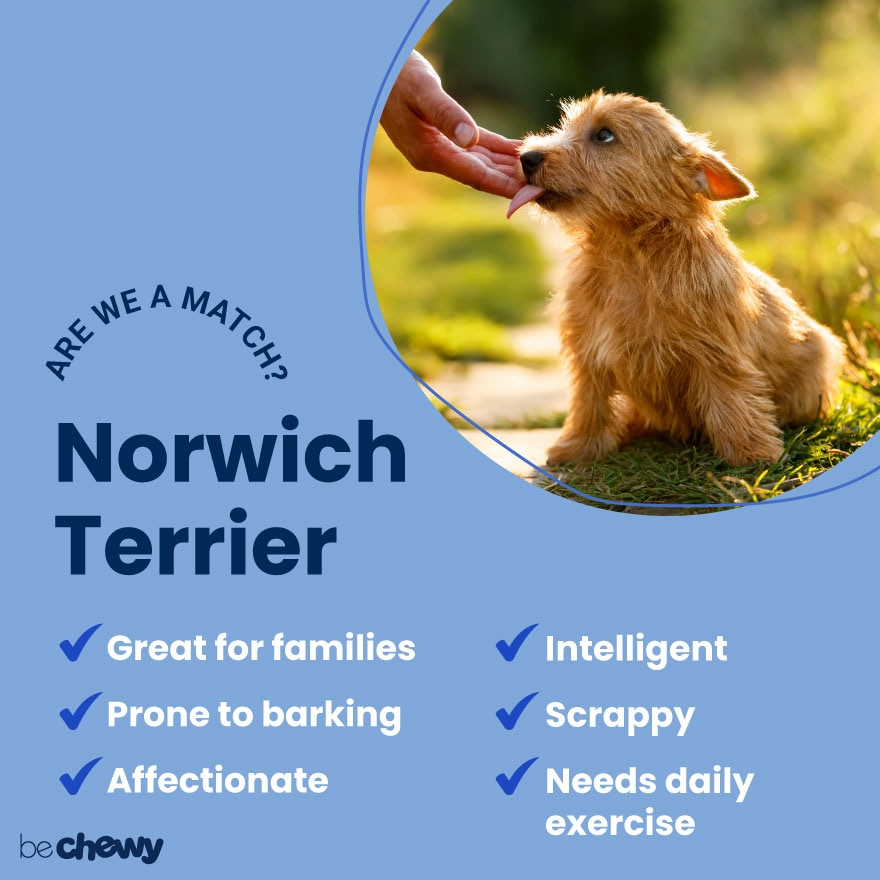
Top Takeaways
Norwich Terriers are loyal, affectionate and they make a great family dog. With a Norwich Terrier, you get a sweet companion who’s scrappy and fearless, all wrapped up in the cutest little bundle. While these dogs have plenty of energy and exercise is a must, a daily walk coupled with human company and mental stimulation should be enough.
Expert input provided by Jody Haas Wolfson, CPDT-KA, and owner of Root Dog Training, and Al Ferruggiaro, Past-President of the Norwich Terrier Club of America and AKC approved judge for all terrier breeds.
Breed characteristic ratings provided by veterinarian Dr. Sarah J. Wooten, DVM, CVJ, a veterinarian at Sheep Draw Veterinary Hospital in Greeley, Colorado; dog trainer and behavior consultant Irith Bloom, CPDT-KSA, CBCC-KA, CDBC, owner of The Sophisticated Dog, LLC, in Los Angeles; and certified animal behavior consultant Amy Shojai, CABC, in Sherman, Texas.
The health content was medically reviewed by Chewy vets.
Photo credit for “How do I look?” American Kennel Club

Search for Adoptable Norwich Terriers Near You
Female Names
- Winnie
- Daisy
- Penny
- Luna
- Rosie
- Bella
- Millie
- Piper
- Annie
- Sadie
Male Names
- Archie
- Norman
- Baxter
- Cooper
- Griffin
- Oliver
- Benny
- Louie
- Samson
- Winston
Share:
